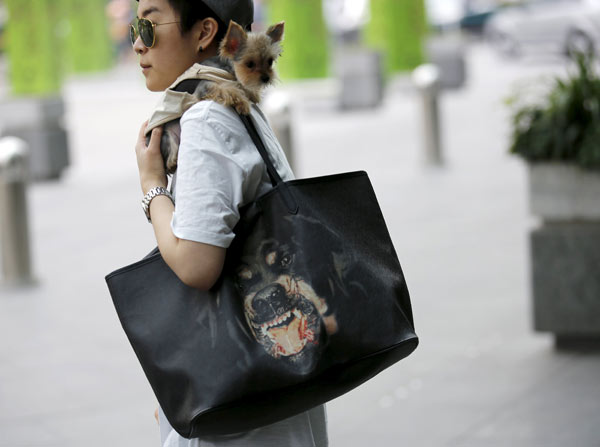Top dog: China's newfound passion for pets is big business
(Agencies) Updated: 2015-06-04 07:36
 |
|
A woman carries her pet dog on her shoulder in front of a shopping mall in Beijing, China, June 1, 2015. [Photo/Agencies] |
HONG KONG/SHANGHAI - Shanghai bank employee Frances Chen spends about a fifth of her monthly salary on her poodle Cookie, one of the millions of pet owners turning China's pet care industry into one of the fastest growing in the world.
Chen takes Cookie to a groomer for a weekly shower and feeds it imported food, costing her some 2,000 yuan ($320) a month. "I want to give him the best," said the single, 26-year-old who lives with her parents. "He's our kid. The only difference is that he can't speak human languages."
Having a pet has now become a symbol of financial success in China, where consultants Euromonitor forecast the pet care sector to grow by more than half to 15.8 billion yuan ($2.6 billion) by 2019, outpacing the world's biggest market the United States, which is expected to grow just over 4 percent this year to $60.6 billion.
The prospects have multinationals such as Mars Inc, Nestle S.A., Procter & Gamble Co and Colgate-Palmolive Co licking their lips, especially as growth in the overall retail market slows along with the world's second largest economy.
Dogs are by far the most popular pets and dog food sales alone are expected to almost treble to over $760 million by 2019, Euromonitor data shows, as higher disposable incomes make keeping a pet an affordable luxury for more Chinese, particularly in more developed cities.
The loneliness and stress endemic to city life are also driving the pet ownership boom: last year, some 30 million households, or nearly 7 percent of the nationwide total, owned a dog, Euromonitor said.
Matthias Berninger, Mars global head of public affairs, said there was plenty of room for growth in China's pet food market, which was already expanding beyond most industry expectations.
"Pet food penetration in China is very, very low," he said. "People didn't believe chocolate would ever be something Chinese consumers would like, let alone that Chinese consumers would become passionate pet owners."
- Govt encourages people to work 4.5 days a week
- Action to be taken as HIV cases among students rise
- Debate grows over reproductive rights
- Country's first bishop ordained in 3 years
- China builds Tibetan Buddhism academy in Chengdu
- Authorities require reporting of HIV infections at schools
- Typhoon Soudelor kills 14 in East China
- Police crack down on overseas gambling site
- Debate over death penalty for child traffickers goes on
- Beijing to tighten mail security for war anniversary







